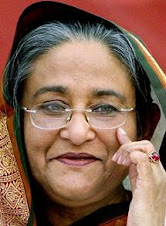NO MORE assets monsters by political power: New Parliament session – New President 
As the new Government of Bangladesh lead by Sheak Hasina ( Awami Leaugue) promised to the nation that they will present a new and corruption free governance, the initiative to prevent the corruption from the top level .Finance Minister Abul Maal Abdul Muhit yesterday said that Ministers and Members of Parliament will have to unveil their assets to the public.
He supposed the move of making assets accounts of elected representatives available to the public was mentioned in the election manifesto of Awami League.
"We were not capable to take the initiative so far this month, but are enforcing it from February," Muhit told newsmen after his first meeting with National Board of Revenue (NBR) officials.
He said the NBR would gather the wealth financial records to target tax evaders.
"A group of assets monsters have been created in our country, we must see whether they pay their taxes," he said. Muhit said none of the tax evaders will be spared, and to this effect political identity will not be considered. "No matter the evader is in our party or in the government. We are not the government of any one party, we are the government of the country of the people," he said.
The finance minister also pointed out revenue from import duty and VAT might decline due to the current global economic depression. "Under this condition, there is no choice to enhancing internal income."
Muhit hinted price of diesel could be reduced further, and fertilizer may follow soon.
"The price of diesel could be lowered a little more in line with the global trend," he said.
He said that budgetary constraints would be taken into account before such a decision.
"The situation of Bangladesh Petroleum Corporation (BPC) must be considered."
New Parliament session is on 25 th Jan :
Bangladesh President Iajuddin Ahmed has summoned the country's new parliament to embrace its first session on Jan. 25, said an official handout on Thursday.
The country's ninth parliament, shaped through parliamentary elections held on Dec. 29, 2008, will decide on the country's new President, the Speaker and the Deputy Speaker in its first session.
Ruling party Awami League led by Prime Minister Sheikh Hasina has already named the party's senior leader Zillur Rahman for the office of the President.
Since Awami League has got 230 seats, more than two-third majority in 300-member parliament, Rahman will be elected the President.
Incumbent President Iajuddin elected by former ruling Bangladesh Nationalist Party (BNP) has already completed his five-year period. According to Bangladesh Constitution, Iajuddin will hold the presidency awaiting a new President is elected.
The last parliament was dissolved in October 2006 on completion of its five-year term. The country's ninth parliamentary elections, originally scheduled in January 2007, were postponed following violent disputes over electoral issues between major parties.

As the new Government of Bangladesh lead by Sheak Hasina ( Awami Leaugue) promised to the nation that they will present a new and corruption free governance, the initiative to prevent the corruption from the top level .Finance Minister Abul Maal Abdul Muhit yesterday said that Ministers and Members of Parliament will have to unveil their assets to the public.
He supposed the move of making assets accounts of elected representatives available to the public was mentioned in the election manifesto of Awami League.
"We were not capable to take the initiative so far this month, but are enforcing it from February," Muhit told newsmen after his first meeting with National Board of Revenue (NBR) officials.
He said the NBR would gather the wealth financial records to target tax evaders.
"A group of assets monsters have been created in our country, we must see whether they pay their taxes," he said. Muhit said none of the tax evaders will be spared, and to this effect political identity will not be considered. "No matter the evader is in our party or in the government. We are not the government of any one party, we are the government of the country of the people," he said.
The finance minister also pointed out revenue from import duty and VAT might decline due to the current global economic depression. "Under this condition, there is no choice to enhancing internal income."
Muhit hinted price of diesel could be reduced further, and fertilizer may follow soon.
"The price of diesel could be lowered a little more in line with the global trend," he said.
He said that budgetary constraints would be taken into account before such a decision.
"The situation of Bangladesh Petroleum Corporation (BPC) must be considered."
New Parliament session is on 25 th Jan :
Bangladesh President Iajuddin Ahmed has summoned the country's new parliament to embrace its first session on Jan. 25, said an official handout on Thursday.
The country's ninth parliament, shaped through parliamentary elections held on Dec. 29, 2008, will decide on the country's new President, the Speaker and the Deputy Speaker in its first session.
Ruling party Awami League led by Prime Minister Sheikh Hasina has already named the party's senior leader Zillur Rahman for the office of the President.
Since Awami League has got 230 seats, more than two-third majority in 300-member parliament, Rahman will be elected the President.
Incumbent President Iajuddin elected by former ruling Bangladesh Nationalist Party (BNP) has already completed his five-year period. According to Bangladesh Constitution, Iajuddin will hold the presidency awaiting a new President is elected.
The last parliament was dissolved in October 2006 on completion of its five-year term. The country's ninth parliamentary elections, originally scheduled in January 2007, were postponed following violent disputes over electoral issues between major parties.



